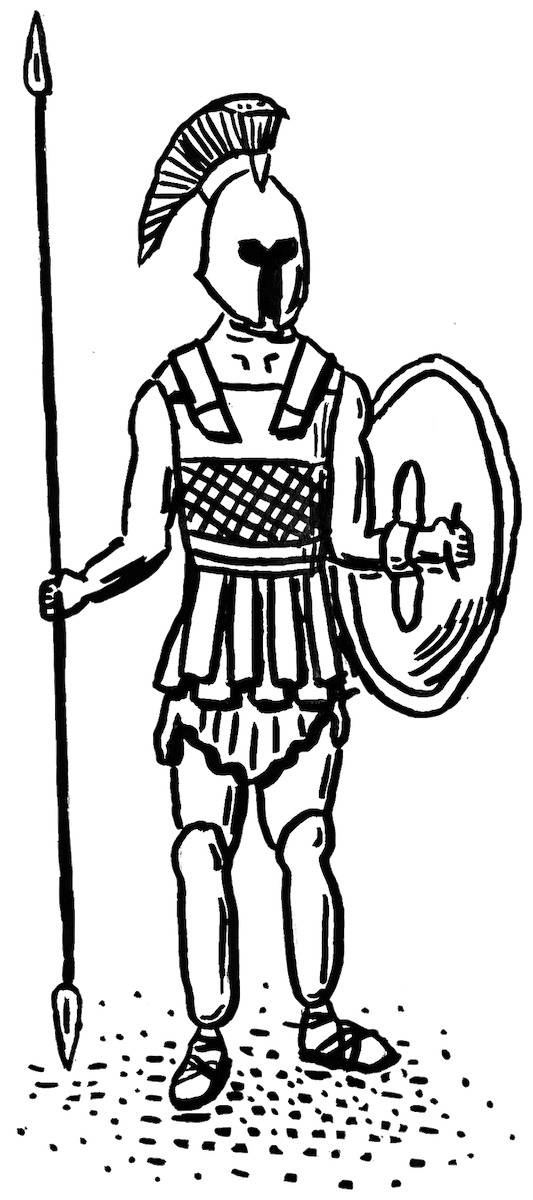Courage to Be by Paul Tillich

In Plato’s dialogue Laches, Socrates is trying to define courage with military general Nikias, who suggests it is the knowledge of “what is to be dreaded and what dared”. While not able to provide a better alternative himself, Socrates points out that acting truly courageously would then require a universal understanding of good and evil. The philosopher finds the explanation inadequate because it would make courage amount to all virtue while he maintains it should be just a part of virtue.
Tillich doesn’t mind that. He thinks all attempts to explain courage lead to the question of the nature of being. Tillich argues courage is an expression of self-affirmation, something “in which a being fulfills its potentialities or actualizes its perfections”. And that’s what virtue is all about.
Furthermore, courage has the character of “in spite of”. Courage is self-affirmation in spite of life’s ambiguity and whatever conflicts with it. This self-affirmation may require sacrificing elements of our being if they would ultimately prevent us from reaching fulfillment—including even our very existence.
Since the greatest test of courage is the readiness to make the greatest sacrifice, the sacrifice of one’s life, and since the soldier is required by his profession to be always ready for this sacrifice, the soldier’s courage was and somehow remained the outstanding example of courage.
Conventionally, courage is described as the power of the mind to overcome fear. What’s underlining every fear is anxiety. The distinction is that fear has a definite object which can be acted upon whereas anxiety doesn’t. For example, anxiety about death can manifest as the fear of getting killed by sickness or an accident—something that can be “faced, analyzed, attacked, endured”. Tillich asserts anxiety is exclusively (setting neurotic anxiety aside) the state of being aware of one’s own eventual nonbeing and has bad news for you: it belongs to existence itself and can’t be eliminated.
Anxiety strives to become fear, because fear can be met by courage. It is impossible for a finite being to stand naked anxiety for more than a flash of time.
Tillich distinguishes three (not mutually exclusive) forms of anxiety. The anxiety of fate and death is caused by the awareness of life’s contingency and the complete loss of self at our biological extinction. The anxiety of emptiness and meaninglessness is evoked by the lack of an answer to the spiritual question of the meaning of existence, that on which all other meanings are built. The anxiety of guilt and condemnation is induced by the unavoidable deviations from acting according to our sense of moral responsibility.
All three types of anxiety contribute to despair, the utterly hopeless situation. Nonbeing is felt as absolutely victorious, but ironically, enough being is left to feel it. The sufferer desperately wants to surrender the awareness of nonbeing. So, why is suicide not an option? Tillich thinks anxiety of fate and death could be possibly escaped by voluntary death but for most of us, the finite act of self-negation is not enough to defeat the infinite weight of guilt and condemnation together with emptiness and meaninglessness. Perhaps this is a philosophical way of framing our biologically hard-wired survival instinct.
If life is as meaningless as death, if guilt is as questionable as perfection, if being is no more meaningful than nonbeing, on what can one base the courage to be?
How can courage arise from despair? Tillich thinks the only possible answer is that accepting despair is in itself faith, which is the basis of the courage to be. Contrary to many popular notions, Tillich asserts faith is not a theoretical opinion or belief in something uncertain, but the state of accepting that something transcends ordinary experience. Faith is simply faith. It has been deprived of content by doubt and meaninglessness.
Tillich insists faith must be understood through the courage to be and its two inseparable constituents: to be as oneself and to be as a part. The courage to be as oneself is affirming the indivisible, centered self—the one threatened by nonbeing. The courage to be as a part is self-affirmation by participating in the world—or, as Tillich calls it, “being-itself”. Neither of these two poles is enough by itself. Radical participation leads to the loss of self and radical individualization leads to the loss of the world. Both individualization and participation have to be transcended for absolute faith.
Tillich deconstructs several ideologies in the book, illustrating the concepts and proving their usefulness. Christianity gets dissected perhaps the most. It presents a doctrine where courage is subsumed under faith in cosmic salvation (note the discrepancy to Tillich’s usage of the terms). The anxiety of fate and death is conquered by participating in the divine Jesus Christ who has taken the burden upon himself. The anxiety of emptiness and meaninglessness is partially suppressed by authoritatively imposed answers, requiring to surrender the right to ask and to doubt. The anxiety of guilt and condemnation—roused by sin, purgatory, and hell—is originally the most prominent. This gets addressed by Luther in Reformation, introducing direct personal encounter with God, bypassing the institutional church, along with total and immediate certainty of acceptance and forgiveness. This courage is personal, yet rooted in infinity, thus embodying and surpassing both the courage to be as oneself and the courage to be as a part.
Finally, Tillich calls for transcending theism. God as an all-powerful and all-knowing subject makes us into objects deprived of our subjectivity. Faith is not just union with the ground of being or personal encounter with God. Faith is accepting the “God above God” who is not a being but being-itself. Faith is the experience of self-affirmation through which we participate in being-itself.
The courage to be is rooted in the God who appears when God has disappeared in the anxiety of doubt.
Courage to Be (The Terry Lectures Series) by Paul Tillich. First published in 1952.